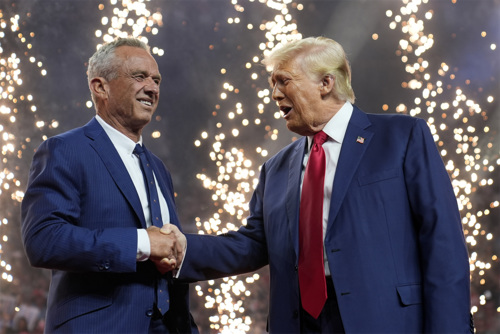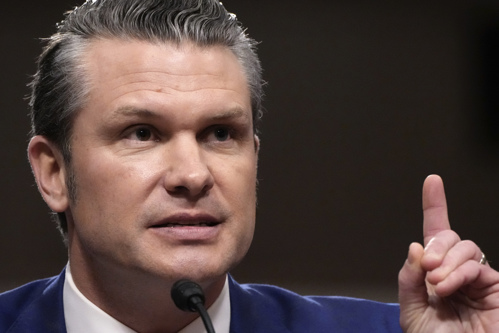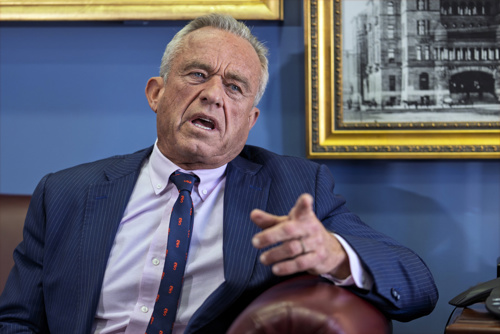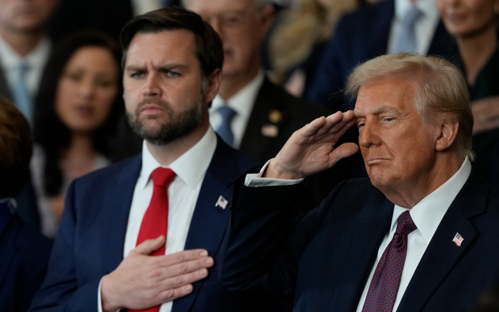Nevertheless, their votes may be enough to get Robert F. Kennedy Jr., Donald Trump’s pick to lead Health and Human Services, across the finish line.
Sen. Thom Tillis (R-North Carolina) explained the logic behind his “yes” vote Tuesday, helping Kennedy advance out of the Senate Finance Committee and closer to a full Senate vote, with the idea that no one seems to passionately oppose Kennedy, so why should he?
 Critics have expressed concern for Kennedy’s positions on life, guns and genetically modified organisms in the food supply, yet there’s been no organized opposition to his nomination, Tillis said.
Critics have expressed concern for Kennedy’s positions on life, guns and genetically modified organisms in the food supply, yet there’s been no organized opposition to his nomination, Tillis said.
“So, maybe it’s time to have a different kind of disruptor there,” the senator said.
When the full Senate will vote on Kennedy has not been announced.
Blaze TV host Steve Deace said on American Family Radio Wednesday that Tillis’ position, while helpful to Trump’s agenda, may have been disingenuous.
“That was essentially him saying, ‘Well, typically all the special interests that I'm a proxy for and a puppet for didn't pull my string on this. So then I go with my other vested interest, which is I really don't want to face the wrath of Trump in a primary because my base back home hates my guts as it is. So, you got my vote.' That's essentially what it was,” Deace told show host Jenna Ellis.
 Tillis was a potential obstacle to the confirmation of Defense Secretary Pete Hegseth before finally becoming the 50th “yes” vote on Trump’s pick.
Tillis was a potential obstacle to the confirmation of Defense Secretary Pete Hegseth before finally becoming the 50th “yes” vote on Trump’s pick.
The GOP senator is considered generally conservative, though he’s taken some moderate positions such as his support for the Bipartisan Safer Communities Act and the Respect for Marriage Act.
Messy world of politics and principles
“In a fallen world, we have a group of our (Christian) people who have turned politics into such an idealistic pursuit that if we can’t obtain 100% of everything that we have betrayed our principles, and we can’t do it,” Deace, known for his Christian faith and his savvy political observations, observed.
“Or the other thing is we just have no principles," he continued. "We have no Word of God, or an ultimate allegiance or playbook, that’s supposed to bind and guide or conscience except for political expediency.”
 Kennedy has expressed support for abortion rights, including “full-term abortion” as recently as May of last year in an interview with Sage Steele. He later backtracked and in a post on X said he believes abortion should be legal until fetal viability, which is around 23-24 weeks of pregnancy.
Kennedy has expressed support for abortion rights, including “full-term abortion” as recently as May of last year in an interview with Sage Steele. He later backtracked and in a post on X said he believes abortion should be legal until fetal viability, which is around 23-24 weeks of pregnancy.
During his confirmation hearings, Kennedy said he would support Trump’s policies. That would mean Kennedy would support ending federal funding for abortion and restricting late-term procedures.
Democrats in the hearings accused Kennedy of “selling out” his pro-abortion positions to secure Trump’s nomination.
The reality, Deace says, is that while Kennedy is an imperfect nominee to lead HHS, he’s going to appeal to many pro-life Christians because – as Trump has done in the early days of his second term – he’ll fight against the status quo.
 “Donald Trump and RFK Jr. are, frankly, more popular with the listeners of AFR than pro-life Inc. is, than most Republican senators like Thom Tillis are," Deace said.
“Donald Trump and RFK Jr. are, frankly, more popular with the listeners of AFR than pro-life Inc. is, than most Republican senators like Thom Tillis are," Deace said.
"I mean, I would prefer that the Levite priest, who's well-indoctrinated into the Torah, is the one who would go and lead the fight against the Philistines," he said. "But that's not the era we live in right now, so Samson I guess it is."
Ultimately, the Tillis vote to get Hegseth over the hump was important. So is the Tillis support for Kennedy because both serve to advance Trump’s agenda in these critical early days.
Executive orders created momentum
Looking ahead to the next four years, after only two weeks into Trump's term, the Blaze TV host questions whether Trump’s “winning” can sustain his blistering pace out of the gate.
“I don’t know that long-term wins are possible,” he said.

That prediction, which might be popular with Trump's most loyal MAGA fans, comes after President Trump signed a flurry of executive orders to put political wheels in motion.
Eventually, Deace explained, Trump may have to settle in and rely more on legislation and Capitol Hill votes to enact change and his "Make America Great Again" agenda.
His State of the Union address is coming up March 4 and by then “he’ll be pretty exhausted on what he can initiate executively,” Deace said.
 Until then, however, the blistering pace is like a German blitzkrieg attack in World War II. So far it is keeping Democrats from regrouping, from developing a strategy to counter-attack the new president and tear down the executive actions that are coming in waves.
Until then, however, the blistering pace is like a German blitzkrieg attack in World War II. So far it is keeping Democrats from regrouping, from developing a strategy to counter-attack the new president and tear down the executive actions that are coming in waves.
“They’re not doing the first 100 days thing a president typically does, where it's kind of an issue a week and a theme a week," Deace told show host Jenna Ellis.
Instead, he said, he likens it to a political version of the D-Day invasion.
"They're not giving our enemies a week to sit there and deconstruct, and lie, and dissemble on an issue," he said.







